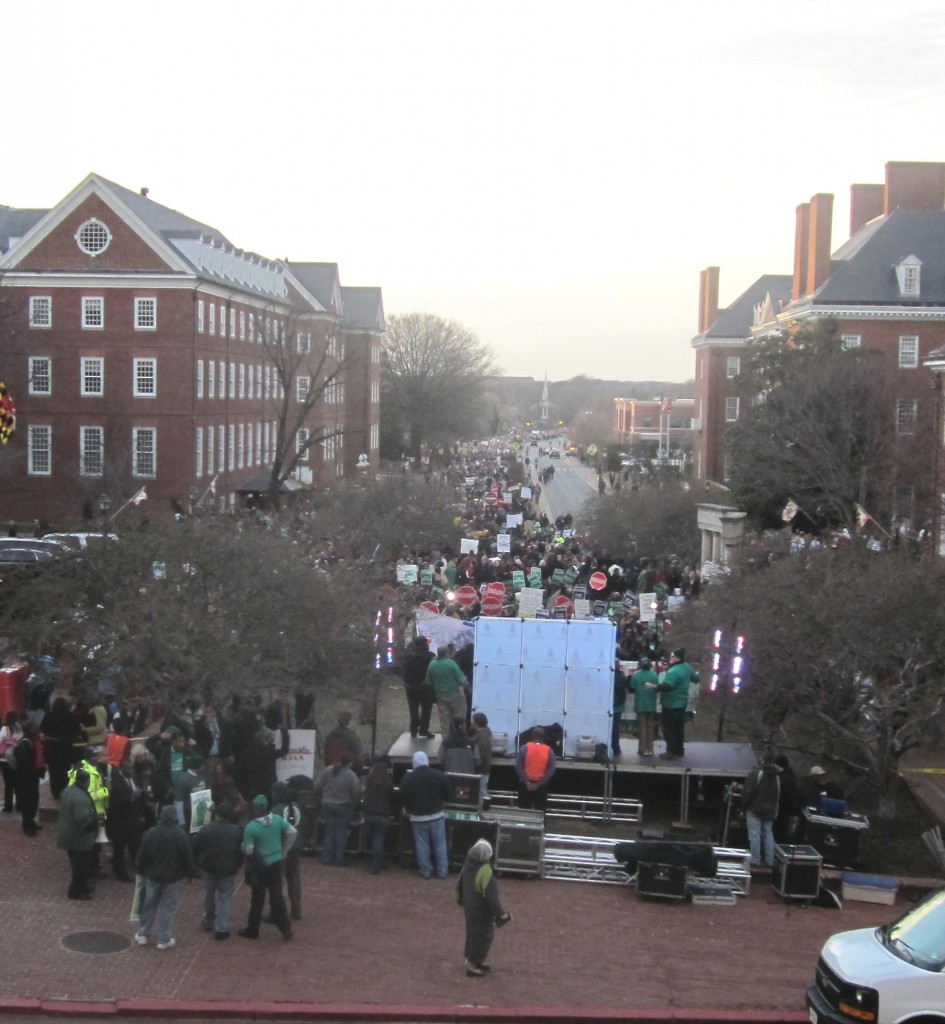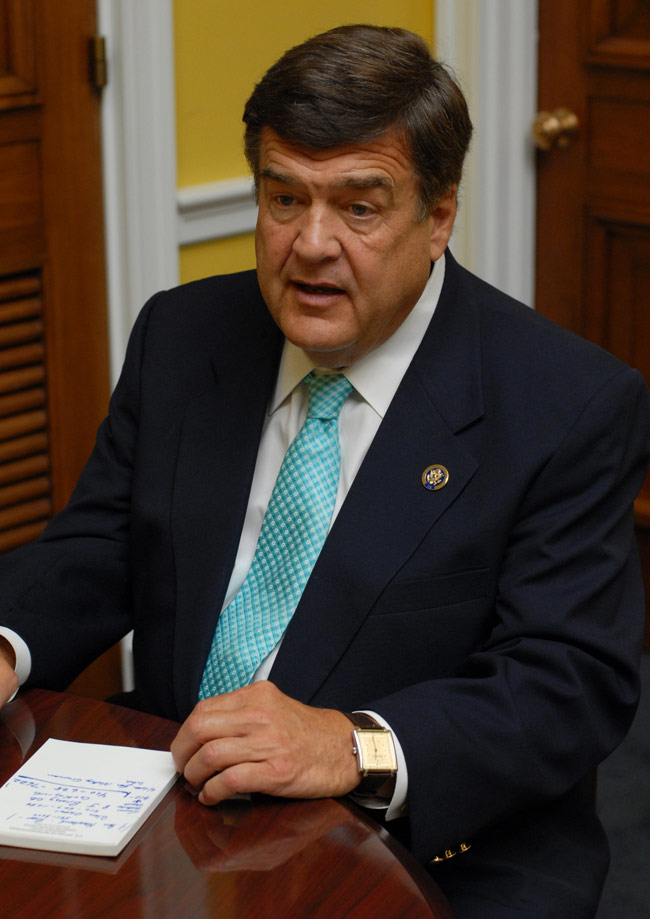Poll finds strong support for minimum wage hike; state employees pensions considered too low
By Len Lazarick
A new poll found strong public support for increasing Maryland’s minimum wage to $10 an hour, a step being pushed for the upcoming General Assembly session.
The poll by Goucher College also found the majority of the Maryland public regards current pensions for retired state employees as too low, and also thinks all Maryland workers, not just those employed by the state or local governments, should have a pension.
Assessing the name recognition of politicians, the Goucher poll found that U.S. Rep. Dutch Ruppersberger, a Baltimore County Democrat who is considering a run for governor, had significant name recognition throughout the state, only exceeded by Lt. Gov. Anthony Brown and Attorney General Doug Gansler, who have been on the statewide ballot twice.
The poll was conducted by the Sarah T. Hughes Field Politics Center at Goucher College in Towson Oct. 27-31, contacting 665 Maryland residents by land line and cell phone. It has a margin of error of 3.8%. Unlike other public polls released to the media, such as the Gonzales Research poll, the Goucher center surveys residents regardless of whether they are registered or likely voters.
Public employee pension questions

Looking west from the State House steps, thousands fill Lawyer’s Mall, Bladen Street and Rowe Boulevard for the “Keep the Promise” rally against pension changes in 2011.
The poll’s three questions on state employee pensions were formulated by Kromer in consultation with MarylandReporter.com, which is working on a pension project funded by the Abell Foundation.
The poll asked two different questions about state employees. Half the respondents selected randomly were asked: “Do you think the average pension for a retired state employee is too little, too much or about the right amount?”
About 36% said “too little,” 21% said “about right,” 11% said “too much,” but almost a third (31%) said they didn’t know.
However in a second question, respondents were told “retired state employees receive an average annual pension of $12,000 per year” — a figure from the state pension system’s annual report. Nearly three out of five respondents (59%) said that was too little, and 26% said it was about the right amount, and the number who said they didn’t know was down at 9%.
Two thirds of the respondents said that “All Maryland workers, not just those employed by the state or local governments, should have a pension,” with half of those (33%) strongly agreeing. About 28% disagreed.
Hughes Center director Mileah Kromer, political science professor, said she was “surprised” how much the information about state employee pensions changed the responses.
Questions were not asked about state teacher pensions, averaging about $19,000 in one plan and $33,000 in an older version, because teachers overall have higher average salaries than state employees, and questions about the compensation teachers, police and firefighters tend to skew toward more positive results.
Support for minimum wage
However there was little change in the results when survey respondents were given more information about the state’s minimum wage.
Asked “Would you support or oppose raising the state minimum wage to $10 per hour?,” almost half the respondents (48%) strongly supported the idea, regardless of whether they were told the minimum wage was currently $7.25. Another 21% to 26% supported the proposal, meaning almost three-quarters of the populace supported the wage hike that a legislative committee rejected last year. Only 22% to 27% opposed the idea.
Legislative leaders are now backing the idea.
Name recognition for candidates for governor
On the name recognition questions, callers only said they were “going to mention the names of some people in the news,” and were not given any titles.
Lt. Gov. Anthony Brown was recognized by 62%; Attorney General Doug Gansler by 58%; U.S. Rep. Dutch Ruppersberger, 49%; Harford County Executive David Craig, 31%; Charles County businessman Charles Lollar, 23%; Del. Ron George, 22%; and Del. Heather Mizeur, 13%.
Brown, Gansler and Mizeur are Democrats running for governor; Craig, Lollar and George are Republicans running for governor. Ruppersberger is considering a run, and his name recognition is “really good,” Kromer said. “It’s a memorable name.”
Ruppersberger has been in the national and local news recently as the ranking Democrat on the House Intelligence Committee with oversight of the National Security Agency, which is in his 2nd Congressional District.
Kromer said Gansler’s name ID was probably enhanced by recent negative publicity, and the question is whether he can turn that into a campaign advantage.
Characteristics of new governor, legislative priorities
In other questions, the survey asked “what is a characteristic you would like to have in the new governor” to be elected in 2014. People were allowed to answer whatever came to mind and no categories were suggested, Kromer said.
The top categories were: “Honest/Truthful/Trustworthy, 19% and “Cares/Has compassion for all Marylanders” 13%. Kromer said some people said they wanted a governor to “represent all Marylanders, not just rich people.” In a third category, 8% of respondents wanted a governor focused on the “economy, jobs and fiscal responsibility.”
Asked what they most wanted the state legislature to concentrate on when it begins its session in January, 17% said economic and budgetary issues; 15% said taxes; 13% said jobs and unemployment; 12% said education, and 7% said health care.
Finally, in results similar to a Gonzales poll released last month, Gov. Martin O’Malley’s job approval rating was evenly divided with 41% favorable and 40% unfavorable. Democrats largely had a favorable opinion (55%) and Republicans overwhelmingly did not (71%), with half of independents sharing that opinion.

MarylandReporter.com is a daily news website produced by journalists committed to making state government as open, transparent, accountable and responsive as possible – in deed, not just in promise. We believe the people who pay for this government are entitled to have their money spent in an efficient and effective way, and that they are entitled to keep as much of their hard-earned dollars as they possibly can.


